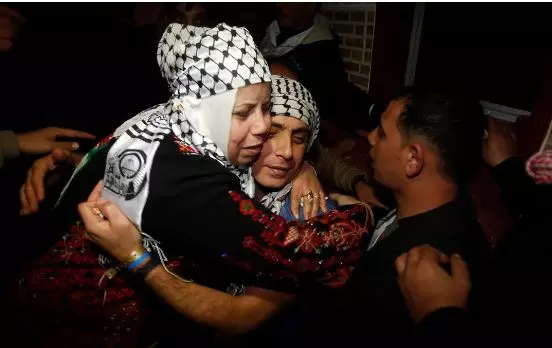
Emotional reunion for families as Palestinian prisoners return amid fragile ceasefire
text_fieldsOver three dozen Palestinian prisoners were welcomed home in the occupied West Bank on Friday, marking a significant development in the fragile cease-fire agreement between Israel and Hamas.
The prisoners, released as part of the deal, were met with a hero's welcome, triggering massive crowds of joyous Palestinians at a checkpoint outside Jerusalem.
The procession of newly freed prisoners included individuals accused of minor offences as well as those convicted of attacks. Fifteen young men, wearing stained grey prison sweat suits and appearing gaunt from exhaustion, were carried through the streets on the shoulders of their emotional fathers. Fireworks illuminated the night sky, and patriotic Palestinian music echoed through the air as the atmosphere turned festive.
Some released prisoners were draped in Palestinian flags, while others proudly displayed the green flags of Hamas, flashing victory signs as they crowd-surfed through the exuberant crowds.
The release followed the initial exchange of hostages between Israel and Hamas during the four-day cease-fire. Two dozen hostages, including 13 Israelis, were released from captivity in Gaza. The deal stipulates that Hamas is to release at least 50 hostages, and Israel is to release 150 Palestinian prisoners over the four days, with the possibility of extending the truce based on additional releases.
While the town of Beitunia near Ofer Prison in the West Bank witnessed celebratory scenes, tensions lingered. The Israeli government, keen to control the situation, ordered police to shut down celebrations, leading to clashes as security forces used tear gas on the crowds. Despite the disturbances, Palestinians viewed the day as a moment of victory, with one resident, asserting that the army couldn't take it away from them.
The released Palestinian detainees included 24 women, some sentenced for attempted stabbings and other attacks, and 15 male teenagers charged with offences like stone-throwing. The exchange, a glimmer of hope in 49 days of conflict, stirred a bittersweet mix of joy and anguish among families on both sides.
The broader context revealed the complexities of the Israeli-Palestinian conflict, with some Palestinians expressing a broken heart for their brethren in Gaza, even as they celebrated the release of their own. The exchange brought attention to the controversial Israeli policy of administrative detention, currently holding an all-time high of 2,200 Palestinians without charges or trial, defended by Israel as a counter-terrorism measure.
For Palestinians, prisoner releases touch the core of their society, with nearly every family having a relative who has been incarcerated. Human rights groups estimate that over 750,000 Palestinians have been in Israeli prisons since 1967. The exchange, reminiscent of past lopsided agreements, presents a moment of relief for families who often see these releases as their only hope to reunite with their loved ones.
With over 7,200 Palestinians currently in Israeli prisons, and more than 2,000 arrested since October 7 alone, the cease-fire and prisoner exchange provided a momentary pause in the ongoing strife.























